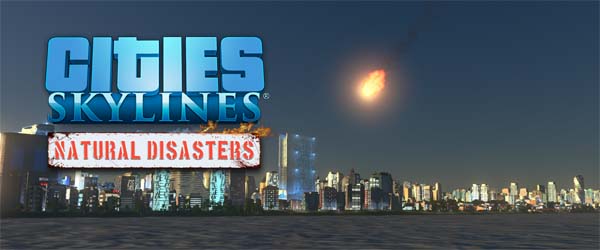
Cities: Skylines has always been a game that takes some different approaches to city builder gameplay. The base game explored how a city's geography can influence the development of the city, and also put a particular emphasis on designing efficient transit infrastructure by allowing the player incredible freedom to construct your own roads, highways, and interchanges, rather than relying on prefab ramps and over/under passes. None of these concepts were new to city builders, but Skylines added nuance to them and made them much more active elements of gameplay.
Its newest expansion DLC, Natural Disasters, follows suit. This is a very difficult expansion to review because its content - by its very nature - is random and unpredictable. Natural disasters aren't new to city builders. Disasters were a popular component of the old SimCity games, as many players enjoyed building up their beautiful metropolises only to unleash earthquakes, tornadoes, meteor impacts, and even alien invasions and dinosaur attacks and watch it all burn. Now Skylines has support for this fan-favorite SimCity feature, but it takes this commonplace feature in some new and interesting directions.
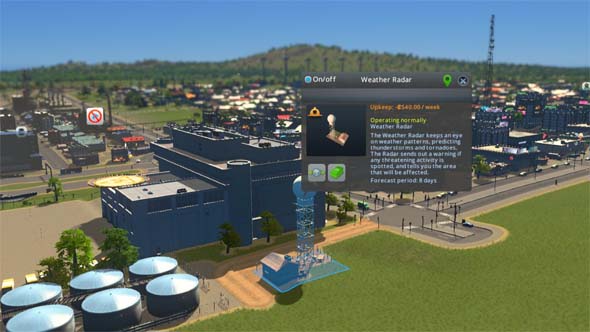
Installing early warning and detection systems will give you advance notice when a disaster is imminent.
Most notably, Cities: Skylines' take on disasters puts emphasis on preparation for disasters, rather than on the chaos of the disaster itself and the clean-up in its aftermath. Like with its SimCity forebears, disasters are something that you can toggle on or off in the game's menu, and you can also adjust their frequency. When enabled, you'll encounter disasters of various flavors ranging from forest fires to lightning strikes, to tsunami and meteor impacts. You'll have to make sure that your city is protected by preventative measures, and that it's protected against these eventualities.
Early-warning systems like firewatch towers, weather radar, and space telescopes can warn you about forest fires, storms or tornadoes, or even incoming meteors (respectively), and can mean the difference between your citizens having enough time to evacuate, or half your population being buried under rubble. You'll need evacuation shelters for you citizens to escape to, and each shelter needs to built long enough in advance for it to be stocked with supplies of food, water, and other essentials (which must be pulled from your city's economy or imported). And lastly, you'll need radio towers to warn your citizens to get to their designated shelters.
Building emergency shelters, stocking them with supplies, and planning evacuation routes will protect your citizens.
You can also create planned evacuation routes similar to bus routes that will pick up residents and take them to a shelter. I had some trouble getting these routes to work properly though. The fact that the buses are dispatched when an evacuation is activated means that they often create a log jam on your roads as they all funnel out of the shelter. I also had issues with the buses apparently not picking up people who were at more distant stops on the route, since the areas along the route that were far from the shelter never managed to evacuate. Maybe there's some trick to getting these routes to work properly that I just haven't found yet. But this does highlight one problem with the expansion: its new systems are not very well documented or explained... [More]
9ae61f59-31e1-483a-bb60-03cd1377e8b2|2|3.0
Tags:Cities: Skylines, Cities: Skylines: Natural Disasters, Colossal Order Ltd., Paradox Interactive, Steam, Steam Workshop, city simulation, DLC, expansion, disaster, natural disaster, emergency, evacuation, fire, earthquake, tornado, meteor, tsunami, flood
In my reviews of The Force Awakens and Rogue One, I complained about how the speed of communications and hyperspace travel seems to have shrunk the Star Wars universe. I asserted that the writers seem to have no appreciation for the size and scale of this universe, or for galactic conflict. That observation severely hurt my enjoyment of both films. Star Wars has always flown lose with its science, but even though the original trilogy got a lot of details wrong (ahem, "parsec"!), there at least seemed to be an effort to respect some scientific believability. Even the prequels stayed fairly respectful to the size and scale of the universe and conflict. The new movies, by comparison, seem completely (and deliberately) scientifically illiterate.
Keep in mind that the following analysis is coming from someone with only minimal knowledge of the extended universe. I'm more of a Trekker than a Star Wars fan (a "Warser"?). I have tech manuals of the Enterprise and the star charts of the Federation, but no Star Destroyer tech manuals or Imeprial star charts. So my opinions come from the films alone. Besides, all those novels, video games, and comic books have been de-canonized by Disney anyway. If anyone more knowledgeable of the Star Wars extended universe wants to chip in with corroborating or conflicting information, feel free to do so in the comments. Thanks to Disney's meddling, such knowledge may now be moot.
And oh, by the way, it drives me nuts when Star Trek movies make these sorts of mistakes as well. I'm looking at you, Star Trek V and first episode of Enterprise!
Hyperspace originally analogous to contemporary air travel
Let's start by looking at a frame of reference: the trip in the Millenium Falcon in the first Star Wars movie. While the Millennium Falcon is in transit from Tatooine to Alderan, Luke has time to receive some rudimentary Jedi training from Obi Wan, Han calmly relaxes and socializes in the lounge, and Chewbacca has time for at least one game of space-chess against the droids. This hyperspace trip is presented as being analogous to cross-continental (or intercontinental) plane flight: at least enough time for passengers to unfasten their safety belts and wander around the cabin.
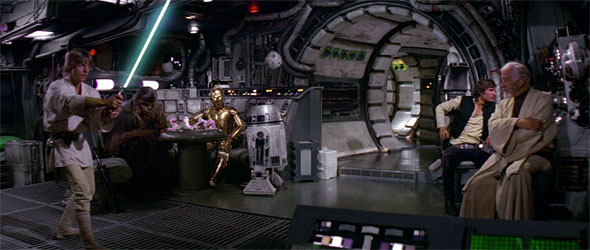
A hyperspace trip in the Millennium Falcon offers at least enough time for everyone to lounge about.
But an estimate of hours is on the low end of the spectrum of possibilities. As far as I can tell, there's nothing in the movie that negates the possibility of this trip to Alderaan taking days. That would certainly be plenty of time for Obi Wan to teach Luke enough of the basics of Force-sensitivity to enable his "lucky shot" in the climactic Death Star trench run. It would also give the characters enough time to socialize, converse and develop some sense of camaraderie with one another. It's also enough time for Leia to undergo at least a couple rounds of interrogation aboard the Death Star... [More]
26fb310b-edb8-4d45-99d9-16fdfa22b05a|2|5.0
Tags:Star Wars, Return of the Jedi, Star Wars: The Force Awakens, Rogue One: A Star Wars Story, hyperspace, faster than light, space, travel, distance, Tatooine, Alderaan, Endor, Battle of Endor, Scarif, Battle of Scarif, Millennium Falcon, airplane, World War II, Pearl Harbor, aircraft carrier
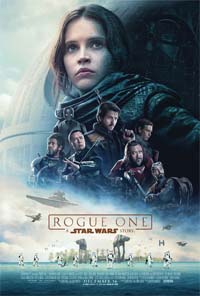
I don't think that Disney's writers take Star Wars' universe very seriously. I'm not talking about story or continuity; I'm talking about the actual, physical space in which the stories take place. They've created a major problem. It's the same problem that frustrated me about The Force Awakens: there is no sense of scale to this universe anymore. I was really hoping that it was just J.J. Abrams and his writing crew being lazy in Force Awakens because his Star Trek movies suffered from the same problem. I had hoped that a new writing crew would improve the material (just like Star Trek Beyond fixed another of my biggest complaints about the reboots of that franchise after J.J. left the helm). But that laziness seems to not only be contagious, but has actually gotten worse in Rogue One. This movie takes something that was only a nagging annoyance in Force Awakens, and blows it up to almost movie-breaking proportions.
In the original Star Wars movies, the time-frames for hyperspace travel was always ambiguous. There were cuts between scenes, and the amount of time that it took for ships to travel was left to the individual viewer's imagination. But now, we see interstellar travel and communications happen instantaneously, in real time! It happens when the fighter crashes on Eado, and the rebel base on Yavin immediately loses contact and sends a squad of fighters to assault the base. It happens again when Rogue One infiltrates the Imperial data warehouse on Scarif, a transmission is intercepted, and a rebel fleet immediately gets rerouted to the planet.
This isn't just bad science; it's also bad writing. The hyperdrive has become a narrative crutch. For the entire second half of the movie, I felt no tension at all because I knew that if the heroes ever got in a jam, a rebel fleet (or reinforcements) could just appear out of nowhere to save the day. This is a prequel, so I already knew how it was going to end. This lazy script contrivance (and all-around dull characters) also made the journey to get there completely uninteresting.
But it goes deeper. How far apart are these places? Is the entire galaxy that accessible?
Basic elements of the overarching Star Wars storyline just completely break down when travel and communication is instantaneous. There's no distinction between the tightly-controlled "core", and the supposedly-lawless "outter rim" planets if a whole fleet of Star Destroyers can literally FTL to any planet in a matter of seconds. There's no need for anyone to make a hard-copy of the Death Star plans to physically transport it if they can transmit the data instantly. And there's no point in pursuing or intercepting ships (such as Leia's Blockade Runner) if hyperspace travel takes the ship to its destination in a mere moment. The empire's holdings become completely indefensible if entire rebel fleets can appear out of nowhere with no warning. Their installations are publicly visible, but the rebels are hidden. The rebels know where all the imperial bases are, and there's nothing stopping them from just jumping to random bases and blowing them up with no recourse from the empire. This universe has lost the believable, lived-in quality and sense of breadth and variety that the original trilogy so expertly executed. The Star Wars universe is broken.
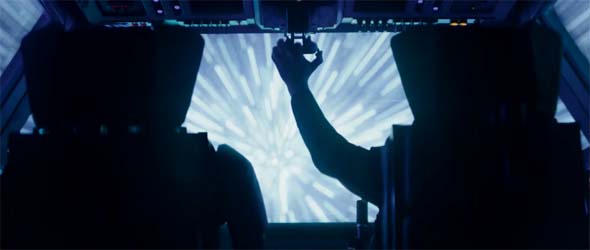
Rogue One shows us instantaneous communication and travel between planets in real time.
"Just turn off your brain and enjoy it", people tell me.
No. I won't turn off my brain. There is no reason why our movies can't be both entertaining and smartly-written. Why aren't we holding our movies to that standard anymore? It's not a tall bar. "Not as bad as the prequels" is not good enough, and I'm not going to pretend that it is when dealing with entries of a series that contains - not one - but two - landmark cinematic masterpieces.
Even if every new movie were as likable as The Force Awakens, these little missteps add up. Each new movie that comes out chips away at the integrity of the franchise (and universe) in which all the movies (including the good ones) exist. We can hand-wave away our complaints about the prequels, or we can ignore them entirely, but we're now at the point at which the original Star Wars trilogy is a minority of the Star Wars film franchise, and it's only getting more diluted. [More]
bed02b8d-cee1-484b-89cb-28dd57548f3e|1|5.0
Tags:Star Wars, Rogue One: A Star Wars Story, Disney, Lucasfilm, prequel, war, espionage, Death Star, Star Destroyer, space, galaxy, faster than light, hyperspace, Grand Moff Tarkin, Darth Vader, uncanny valley, Felicity Jones

I did it again. I waited until the last minute to see a hard science fiction film until it was just about to leave theaters, even though I complain about the conventional Hollywood logic that hard science fiction doesn't sell tickets. In my defense though, I was preparing for a trip out of the country when this movie released. So my excuse this time is far better than my excuse for missing opening weekend of The Martian. And once again, this film's 94% on Rotten Tomatoes (as of the time of this writing) and its exceeding box office projections (coming in third behind a Marvel comic book movie and a children's movie) seems to vindicate that Hollywood can still make high-concept, hard science fiction films, that people will go see them, that people will understand them, and that those people will like them.
Arrival is as hard as hard science fiction gets. Think Contact; think 2001: A Space Odyssey; think the Star Trek TNG episode "Darmok". Arrival is all about communication, and it offers an interesting exploration of how language influences the way that we think, and how our thoughts are filtered through the language that we speak. The entire movie is about the efforts to communicate with the aliens, while human beings progressively become incapable of actually communicating with one another. There's no real villain, exactly one explosion, and the threat of China and Russia starting a war with the aliens on the other side of the globe is a distant, but tangible threat. This film is slow and methodical, much like the efforts to teach a new language to someone, and it makes absolutely sure that the audience will be able to follow along with what is going on.
Moreso than our attempts to communicate with aliens, this film is about our ability (or inability) to communicate with each other - at every level of society. From individual relationships, to professional relationships, to political relationships, to international diplomatic relationships, and even the relationship between the media and the public.
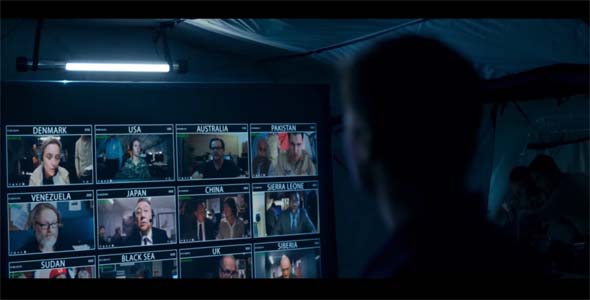
Arrival is more about our inability to communicate with each other, than our inability to communicate with aliens.
It's difficult for me to say anything more about this movie without absolutely, completely spoiling everything. Suffice to say, the high-concept science fiction stuff is very well handled. This movie earns some comparisons to Interstellar, but is far more intelligent and manages to not be hokey at all. Read on if you want spoilers... [More]
023940cc-6fc7-4a26-a273-727d7283c24d|0|.0
Tags:Arrival, Amy Adams, Jeremy Renner, science fiction, grief, extraterrestrial, language, communication, relationships, Slaughterhouse-Five, Kurt Vonnegut, time travel, box office, Hollywood
The Chicago Bears' season has been over for a while now, but they had an opportunity today to play spoilers for the Green Bay Packers' playoff hopes. That didn't really happen, as the Bears settled for a game-tying field goal instead of attempting to convert a fourth and goal from the four yard line to win the game. The Bears had a first and goal at the three yard line with less than two minutes in the game and down by three (27-24). A penalty backed them up to the thirteen, and they weren't able to punch it into the end zone. Micah Hyde swatted a pass out of the hands of Cameron Meredith on third down, and John Fox decided to kick a tying field goal rather than going for the win.
Jordan Howard had rushed for over 90 yards, a touchdown, and a 5.3 yards per carry average over the course of the game, yet John Fox decided to throw the ball on third down and concede to the field goal. I would have put the ball in Jordan Howard's hands and given him both third and fourth downs to try to punch the ball four yards into the end zone. No way I would have settled for three.

Micah Hyde swatted a 3rd down pass that would have given the Bears a late lead.
Chicago had nothing to play for except beating Green Bay. Kicking a tying field goal had no strategic advantage. You have nothing to play for; there's no reason to play it safe. Let your bell-cow running back show what he can do.
Bad decision-making didn't end with the decision to play for the tie. The Packers got the ball back with about a minute left and no timeouts. An injury on third down stopped the clock, but the Bears refused to enforce the ten-second run-off. Aaron Rodgers followed that with a deep bomb, a clock-stopping spiked ball, and a game-winning field goal with three seconds left... [More]
d0996df0-142c-4c8c-96c2-07bc6505593b|0|.0
Tags:Chicago Bears, Chicago, Bears, Green Bay Packers, Green Bay, Packers, Detroit Lions, Minnesota Vikings, football, playoff, division, NFC North, field goal, John Fox, Jay Cutler, Matt Barkley, Jordan Howard, Tony Romo, Ha Ha Clinton-Dix
|

| 12 | | | | | | | 60 | | 11 | | | | | | | 55 | | 10 | | | | | | | 50 | | 09 | | | | | | | 45 | | 08 | | | | | | | 40 | | 07 | | | | | | | 35 | | 06 | | | | | | | 30 | | 05 | | | | | | | 25 | | 04 | | | | | | | 20 | | 03 | | | | | | | 15 | | 02 | | | | | | | 10 | | 01 | | | | | | | 05 |
|